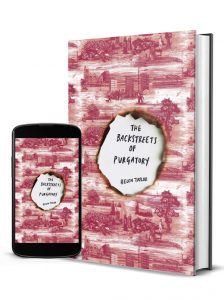Calming My Demons: How Writing My Novel Unexpectedly Helped My Recovery
 Ten years ago, I quit my job, sold the house and left the country. I was moving to France where, I decided, I would become a writer. This was despite a distinct lack of evidence that I had the skill, notwithstanding (or perhaps entirely exemplified by) the heartfelt journals, enthusiastic attempts at poetry and first lines of novels that I’d been fervently composing for years.
Ten years ago, I quit my job, sold the house and left the country. I was moving to France where, I decided, I would become a writer. This was despite a distinct lack of evidence that I had the skill, notwithstanding (or perhaps entirely exemplified by) the heartfelt journals, enthusiastic attempts at poetry and first lines of novels that I’d been fervently composing for years.
I like this version of events. The optimism, the risk, the spontaneity. The truth is much darker. I’d been ill. Seriously ill. So ill I’d almost died. So ill I’d almost lost everything. It was no longer safe for me to work. I couldn’t walk the streets of the city that I loved without being tormented by reminders of how much I had fallen apart.
In January 2019, I had an essay published in Boundless that described some of that stage of my life. A glimpse of when I was sectioned under the Mental Health Act and confined to a psychiatric ward for the worst part of fourteen months. I’d originally written the account many years earlier for an assignment for my Open University creative writing diploma.
My tutor had praised the essay, stressed the importance of sharing stories like mine — stories that were deeply personal but spoke of universal themes — and encouraged me to publish it. But I couldn’t. Although I’d convinced myself the episode was ancient history — by then I’d been living in France for nearly three years — looking back it is easy to see how relatively recent it was, and how fragile and vulnerable I remained. I had no understanding of how long it would take me to recover from such a catastrophic illness. Or what a central role my writing would take in that recovery.
I left the essay to collect dust in the metaphorical equivalent of a shoe box under my bed (I rediscovered it on an old hard-drive I’d used to back up my ancient PC before I’d optimistically restored it to factory settings during one of its hissy fits) and turned my attention to other things.
I was collecting writing qualifications. Certificates, diplomas, an MA. As someone whose life had been measured in passing exams and acquiring letters after their name, I needed tangible proof that I was a writer. It took me a while to compute that it wasn’t the qualifications that counted but the words on the paper. That said, what I learnt about characterisation, story structure, style and the like was a revelation. But the real value of those courses, especially at the beginning, was that they let me grant myself permission to take the time to write. And to dare to let my mind wander.
For years, I’d kept tight control on what I let myself think. I was scared of what might appear if I loosened the bolt and let the contents spill. Early writing exercises were a nightmare. Put a timer on for two minutes. Write whatever comes to mind. Keep going no matter what. This, the handbook explains, is a great way of producing source material for poetry or sparking ideas for short stories. Indeed. I wrote pages and pages of inspirational stuff: I don’t know what to write, I don’t know what to write. Expletives redacted.
But as writing became a habit, things began to change. That it might help my mental health, though, was not even up for consideration. I wasn’t opposed to the idea of writing for catharsis but I was certainly opposed to the idea of inflicting it on others. I’d been scrapping with my demons long enough without forcing others to witness the bloodshed.
Writing wasn’t about recovery. I had therapy and prescription medication and Friday night gin for that. Writing was about exploring the human condition, about overarching themes, about pushing language to its limits. It was about slant rhymes and story arcs and getting fancy notebooks for Christmas (no joke, you should see my collection; it is magnificent).
By the time I started my novel, I’d already developed the writerly habit of pretending to inhabit the same world as everyone else — nodding in the correct places during a conversation — while my mind drifted to whatever issue required tackling in my current piece of work. It would only get worse.
For the three years it took me to write my novel, I had no headspace for anything else. I was utterly absorbed in my characters’ lives. They made me laugh. They made me cry. They behaved in ways that, despite my extensive planning, were capable of shocking me. They visited me in dreams and demanded that I gave them better lines. To keep their bad language under any semblance of control required constant vigilance. And there were plot complexities to unravel, art to research, continuity to check. I was engrossed, obsessed and very, very happy.
In July 2018 The Backstreets of Purgatory hit the shelves in bookshops all over the UK accompanied by a deafening fanfare that could be heard at least across the street (although I suspect the noise was in fact my pals knocking back the wine at the book launch). Six months later, seven years after it was originally written, my essay was published in Boundless. I shared it not as an act of catharsis but in solidarity with others who were suffering as I had and because I was finally strong enough to speak up. It wasn’t simply time that had helped me heal. My writing had too.
—
https://unbound.com/boundless/2019/01/15/inside-ferguson-house/
BIO
In a previous life, Helen trained as a doctor and worked as a research scientist. She knows more than is strictly necessary about the malaria parasite. Her first novel The Backstreets of Purgatory was published by Unbound in 2018 and has nothing whatsoever to do with her research. Her essay Inside Ferguson House describing an episode of life-threatening depression (Boundless, January 2019) was met with such an overwhelming response from readers that she put aside her novel-in-progress to work on the full-length memoir.
 Finn Garvie’s life is one spectacular mess. He spends most of his time fannying around a makeshift Glasgow studio, failing to paint his degree portfolio, while his girlfriend Lizzi treats him like one of her psychology patients, and his best friend Rob is convinced that the tattoos he designs are the height of artistic achievement.
Finn Garvie’s life is one spectacular mess. He spends most of his time fannying around a makeshift Glasgow studio, failing to paint his degree portfolio, while his girlfriend Lizzi treats him like one of her psychology patients, and his best friend Rob is convinced that the tattoos he designs are the height of artistic achievement.
To top it all, Finn is worried that some stinking bastard is hanging around, spying on him, laughing at his cock-ups and eating his leftover curry. Fortunately, he has plenty of techniques to distract him – tackling the church hall renovations with the help of his alcoholic neighbour; pining after Kassia, the splendidly stroppy au-pair; and re-reading that book on Caravaggio, his all-time hero.
Things take a turn for the strange when he finally encounters the person who’s been bugging him, and it seems to be none other than Caravaggio himself…
Art, truth and madness come to blows in this darkly funny debut novel from a startling new talent.
Category: Contemporary Women Writers, How To and Tips































Thank you for sharing. I stay emotionally healthy by writing. Without it, I will fall into dark depressions.